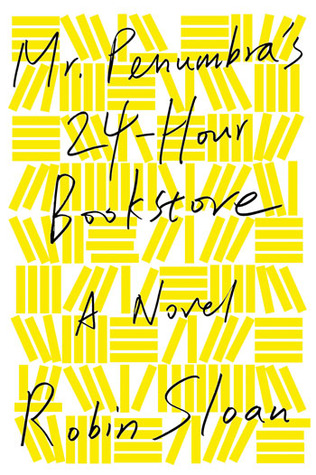Looking over the reviews on Goodreads as I prepare to post this review, I wonder what my problem is. Why didn't I get spine-tingles on the final page? I am forever in pursuit of that 16-again feeling that the best stories can give you. Have I lost that and become a victim of my own snarky reviewer's inner monologue?
I honestly don't know.
I see what Robin Sloan is trying to do. He's trying to write a clever, self-referential, nerdtastic ode to books and stories.
A noble pursuit.
And it is self-referential. But it's just not as clever as it thinks it is. As for nerdtastic, this nerd was somewhat unimpressed.
It's narrator, whose name I truly cannot think of without returning to the novel (Jenner? Jad? Clay? Yes, that's it, Clay), is your friendly San Franciscan Every-manchild, of indeterminate-but-aggressively-under-thirty age, who having lost his job as a graphic designer at a startup called NewBagel (OneWord) comes to make his living in the eponymous bookstore and has an army in implausibly well-connected and well-funded friends.
But, you may be asking, where is the Manic Pixie Dreamgirl? Don't you worry, my hipster friends, Kat the Hot Smart Programmer Chick enters about sixty pages in. As Clenner/Jay/Clad explains to Hot Smart Programmer Chick about his unusual participation in the secret society run out of Penumbra's dusty shop, she replies:
"That's amazing...Google's like a baby compared to that."
And Clay understands that she's even more of a dream girl than he first thought:
That explains it: this girl is a Googler. So she really is a genius. Also, one of her teeth is chipped in a cute way.
Aw. How cute.
Thank God an Average-looking Smart Programmer Chick didn't wander in. The story would never have gotten off the ground.
Kat, btw, is also the only female character of note in this story. A few others make cameos, but they are tokens.
Anyway, a pseudo-mystery plot ensues where Jlad and Kitty Kat pursue some mildly-engaging secrets, meanwhile creating a marriage of true minds between Google and a whole bunch of very dusty books. It's entertaining. But the whole time I just couldn't shake the feeling that in its clever, self-referential tone it believed itself to share a kind of intertextuality with a whole genre of books that are completely out of its league.
Sloan's point is fairly transparent: Books and technology aren't in opposition! They can work together! Sometimes people who read books know even MORE!
But unfortunately what happens is that Sloan undermines his own point. Because when he's trying to invoke Tolkien, Lewis, and even Borges, he's also writing sentences like this:
This is Mat's secret weapon, his passport, his get-out-of-jail-free car: Mat makes things that are beautiful.
And this:
Nobody's looking. I hoist the X high like a mythic sword.
In a book intended for smart people, there is a shocking dearth of complex sentence structure and interesting diction, original writing replaced instead with lists of cliches striving to sound climactic and similes that sound like they're trying to appease childhood readers of T. H. White but don't even come close.
And so Sloan goes on to do what I find that digital apologists-via-print do altogether too often: he oversimplifies. In trying to be clever, his narrator's voice just feels cute and immature. And the solution to his puzzle falls easily out of the sky, funded by his best friend from sixth grade who is now rich because...wait for it: he owns the world's best digital boob creation program.
Because the latent misogyny and female tokenism weren't enough.
I wanted to love this book. I wanted it to be smarter and fresher and more daring. I agree that books and technology aren't in opposition. But Penumbra argues against itself in its derivative simplicity.
You'd be better off picking up Tolkien again if you ask me.


No comments:
Post a Comment